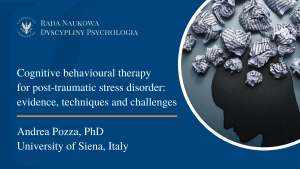12 października 2021, godz. 14:00, aula Wydziału Psychologii UW
Post-Traumatic Stress Disorder (PTSD) is one of the most common psychological reactions to a life-threatening event. According to DSM-5, this condition is characterized by specific symptom clusters, typically arising within the first three months since the event: (a) Re-experiencing symptoms of the event, by means of nightmares, flashbacks, and intrusive memories, (b) Avoidance of reminders of the event, (c) Hyperarousal symptoms (hypervigilance, impaired concentration, increase in startle response, and anger outbreak).
Around 18%–50% of patients experience stable recovery within 3–7 years, while the remaining individuals must cope with a chronic course. The cognitive behavioural model of PTSD assumes that avoidance behaviour is either a marker of clinical severity or a process involved in the maintenance of the clinical picture playing as a negative reinforcement of symptoms. Repetitive avoidance of trauma-related external or internal stimuli that trigger emotional arousal, has the short-term effect of reducing trauma-related arousal but they can reinforce it at long-term through operant conditioning producing a chronicization of symptoms and higher severity. Based on these assumptions, cognitive behavioural scientists and therapists developed Imaginal Prolonged Exposure Therapy as a treatment designed to address post-traumatic symptoms by repeated 'on-purpose’ retelling of the trauma memory. This approach has been effectively combined with cognitive restructuring techniques aimed to target maladaptive cognitions related to the trauma (e.g., “It’s all my fault”). During the last two decades, within the cognitive behavioural model, further treatment approaches have been developed including imagery rescripting and Eyes Movement Desensitization Reprocessing therapy (EMDR) that are based upon different theoretical principles.
Starting from this, the current presentation aims to discuss the available evidence about the effectiveness of the cognitive behavioural therapies for post-traumatic symptoms, focusing on the clinical application of some techniques for specific types of PTSD populations, the limitations, and the challenges for the future.


